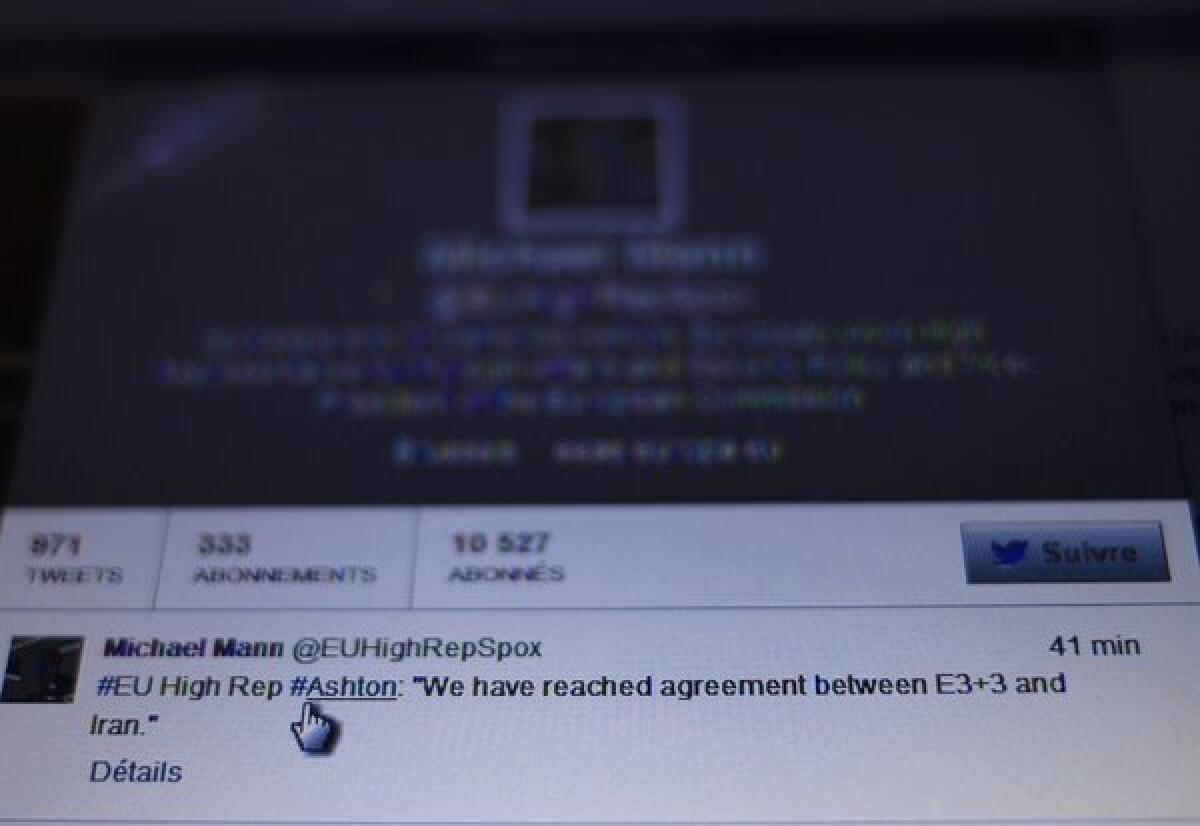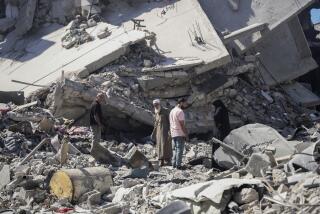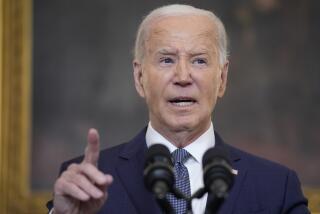President Obama calls Iran deal “a first step”; Republicans critical

WASHINGTON -- President Obama hailed the deal to curtail Iran’s nuclear program as “a first step” that “achieves a great deal” in the effort to prevent Iran from obtaining a nuclear weapon.
Months of diplomacy have “opened up a new path toward a world that is more secure -- a future in which we can verify that Iran’s nuclear program is peaceful, and that it cannot build a nuclear weapon,” Obama said from the White House shortly after the deal was reached in Geneva.
The agreement advances a significant administration priority and would bring at least a pause to the long-running international standoff over Iran’s nuclear ambitions. Ultimately, U.S. officials believe a permanent deal over the nuclear program could lead to a thaw in the three-decade diplomatic freeze between the U.S. and Iran.
“Iran, like any nation, should be able to access peaceful nuclear energy,” Obama said, “but because of its record of violating its obligations, Iran must accept strict limitations on its nuclear program that make it impossible to develop a nuclear weapon.
“The burden is on Iran to prove to the world that its nuclear program will be exclusively for peaceful purposes.”
Obama, however, will have to sell the proposal to skeptics at home and some key U.S. allies, including Israel and Arab countries of the Persian Gulf region. Even as he characterized the agreement as the first tangible success after years of standoff with Iran, Obama also urged Congress to support the diplomatic effort, not undermine it.
“Now is not the time to move forward on new sanctions,” Obama said. “Doing so would derail this promising first step, alienate us from our allies, and risk unraveling the coalition that enabled our sanctions to be enforced in the first place.”
In an indication of the difficulties Obama will face, Republicans began criticizing the deal almost immediately, and some key Democrats also expressed reservations.
In a statement, Sen. Mark Kirk (R-Ill.), who has taken a leading role on the Republican side of the sanctions debate, characterized the deal as requiring only “cosmetic concessions” from Iran that would “neither fully freeze nor significantly roll back its nuclear infrastructure.”
But Kirk stopped short of saying he would push for additional sanctions immediately, suggesting that he would give the interim deal a chance to work first.
“I will continue working with my colleagues to craft bipartisan legislation that will impose tough new economic sanctions if Iran undermines this interim accord or if the dismantlement of Iran’s nuclear infrastructure is not underway by the end of this six-month period,” he said.
In a joint statement released before the negotiations concluded, more than a dozen senators, including John McCain (R-Ariz.) and Foreign Relations Committee Chairman Robert Menendez (D-N.J.), had struck a tougher tone than Obama, describing the threat not as Iran having a bomb, but having the “capability” to produce one.
“A nuclear weapons capable Iran presents a grave threat to the national security of the United States and its allies and we are committed to preventing Iran from acquiring this capability,” the group had said, adding that they would seek “to pass bipartisan Iran sanctions legislation as soon as possible.”
In his statement, Obama nodded to those concerns, saying that Israel and the Gulf countries had “good reason to be skeptical about Iran’s intentions.” He said he would “do what is necessary” to prevent Iran from obtaining a nuclear weapon, but argued the merits of resolving differences peacefully rather than through a “rush towards conflict.”
“Today, we have a real opportunity to achieve a comprehensive, peaceful settlement, and I believe we must test it,” Obama said.
A senior administration official said the deal would halt the progress of the Iranian program under a strict inspection system to ensure that Iran complies with the terms of the agreement.
Core sanctions currently imposed on Iran would remain in place, including oil, banking and financial sanctions, the official said, adding that the president believes that the sanctions can be ramped up and down as needed.
A fact sheet released by the White House late Saturday described an initial, six-month step that includes “significant limits” on the nuclear program and “begins to address” the most urgent concerns about Iran’s enrichment capabilities, its existing stockpiles of enriched uranium, its centrifuges and its ability to produce weapons-grade plutonium at the Arak reactor.
“The concessions Iran has committed to make as part of this first step will also provide us with increased transparency and intrusive monitoring of its nuclear program,” the White House release said. “In the past, the concern has been expressed that Iran will use negotiations to buy time to advance their program. Taken together, these first step measures will help prevent Iran from using the cover of negotiations to continue advancing its nuclear program as we seek to negotiate a long-term, comprehensive solution that addresses all of the international community’s concerns.”
If Iran fails to meet its commitments, the administration official said, international powers will turn the sanctions back up.
The agreement reached Saturday should create “time and space” for more talks, Obama said.
“It won’t be easy. Huge challenges remain ahead,” Obama said. “But through strong and principled diplomacy, the United States of America will do our part on behalf of a world of greater peace, security and cooperation among nations.”
ALSO:Philippines typhoon death toll exceeds 5,000, but ‘worst is over’
Despite U.S. pressure, Karzai sticks by plan to delay signing pact
British seek answers in case of 3 women bound by ‘invisible handcuffs’
kathleen.hennessey@latimes.com
More to Read
Sign up for Essential California
The most important California stories and recommendations in your inbox every morning.
You may occasionally receive promotional content from the Los Angeles Times.












